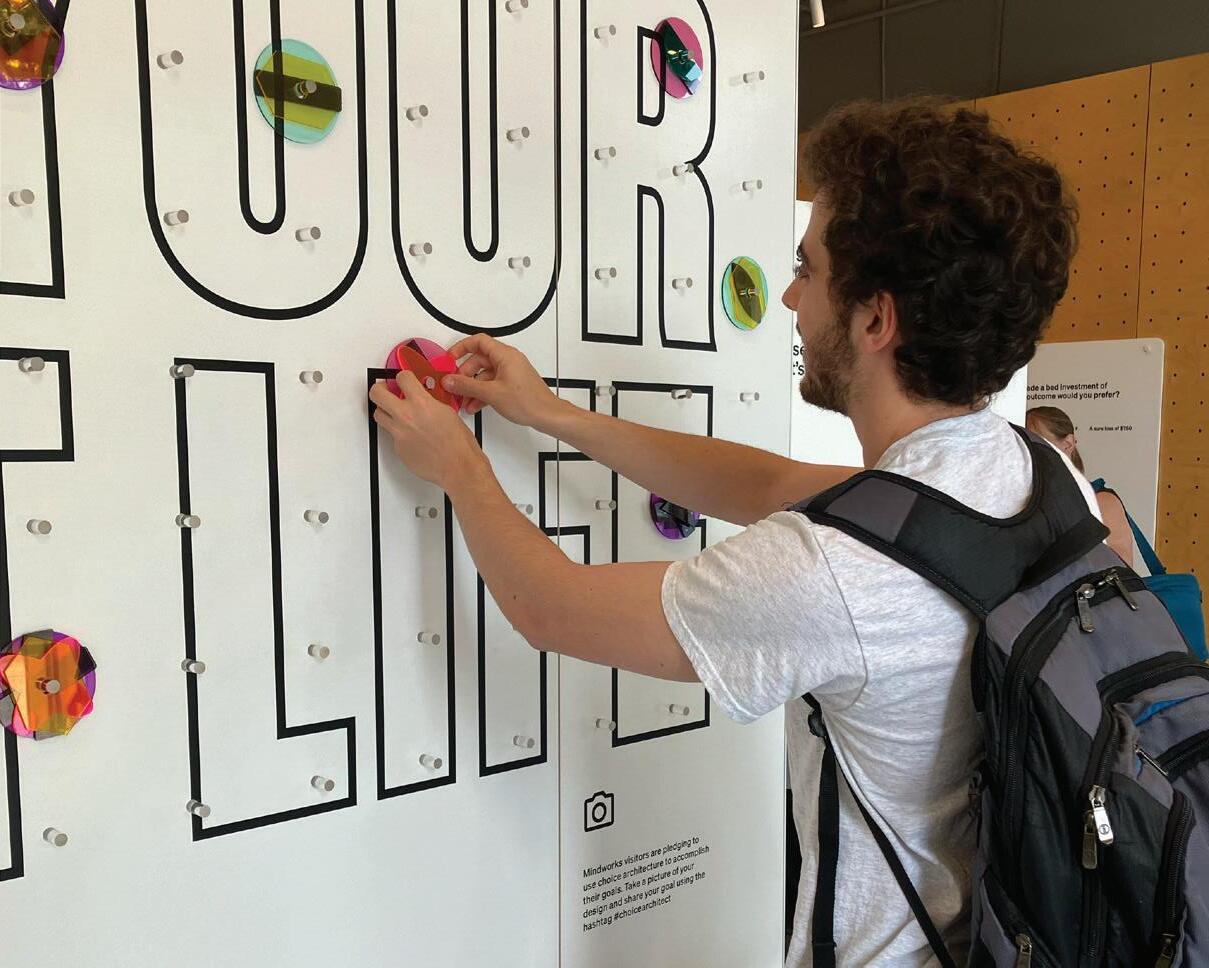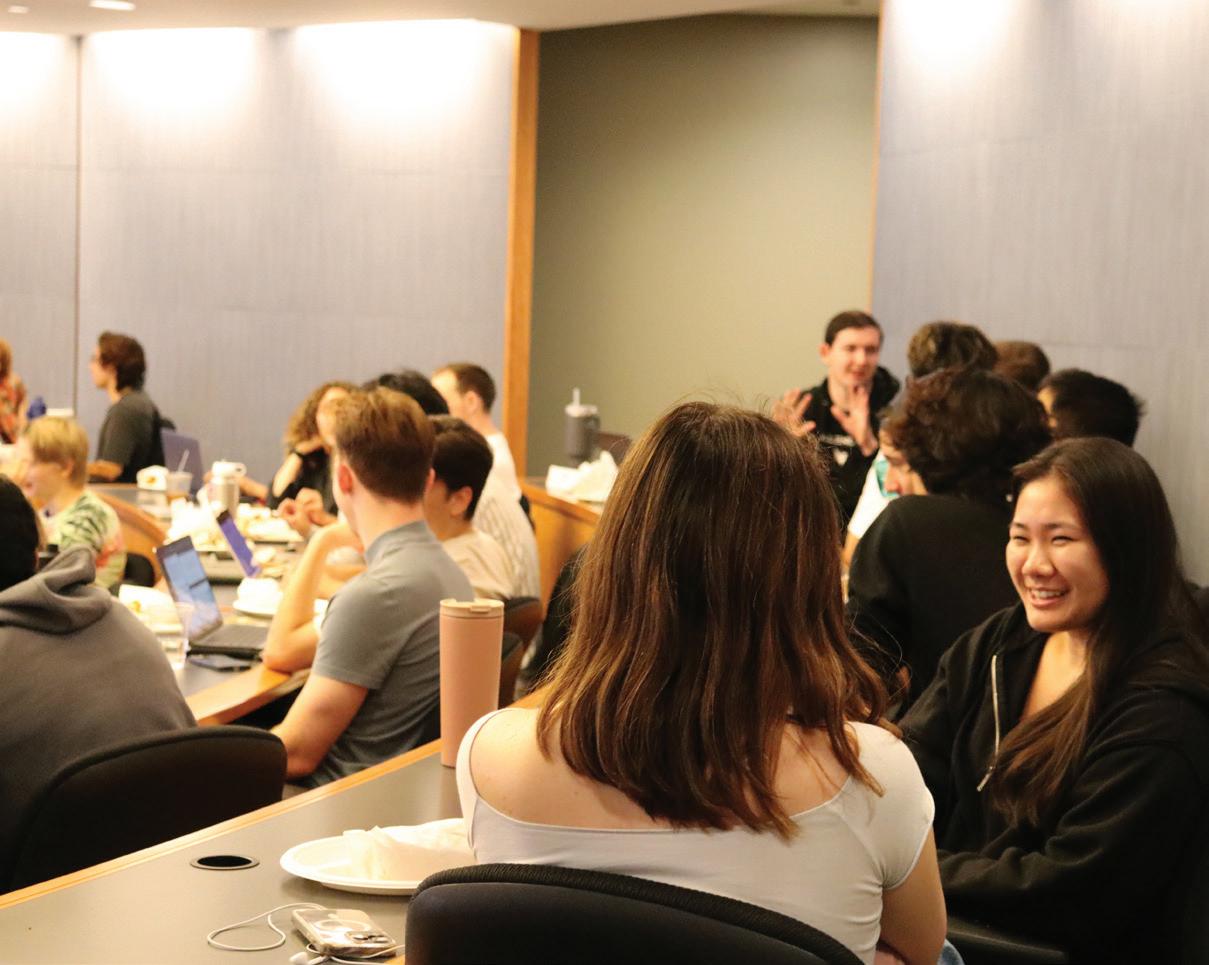
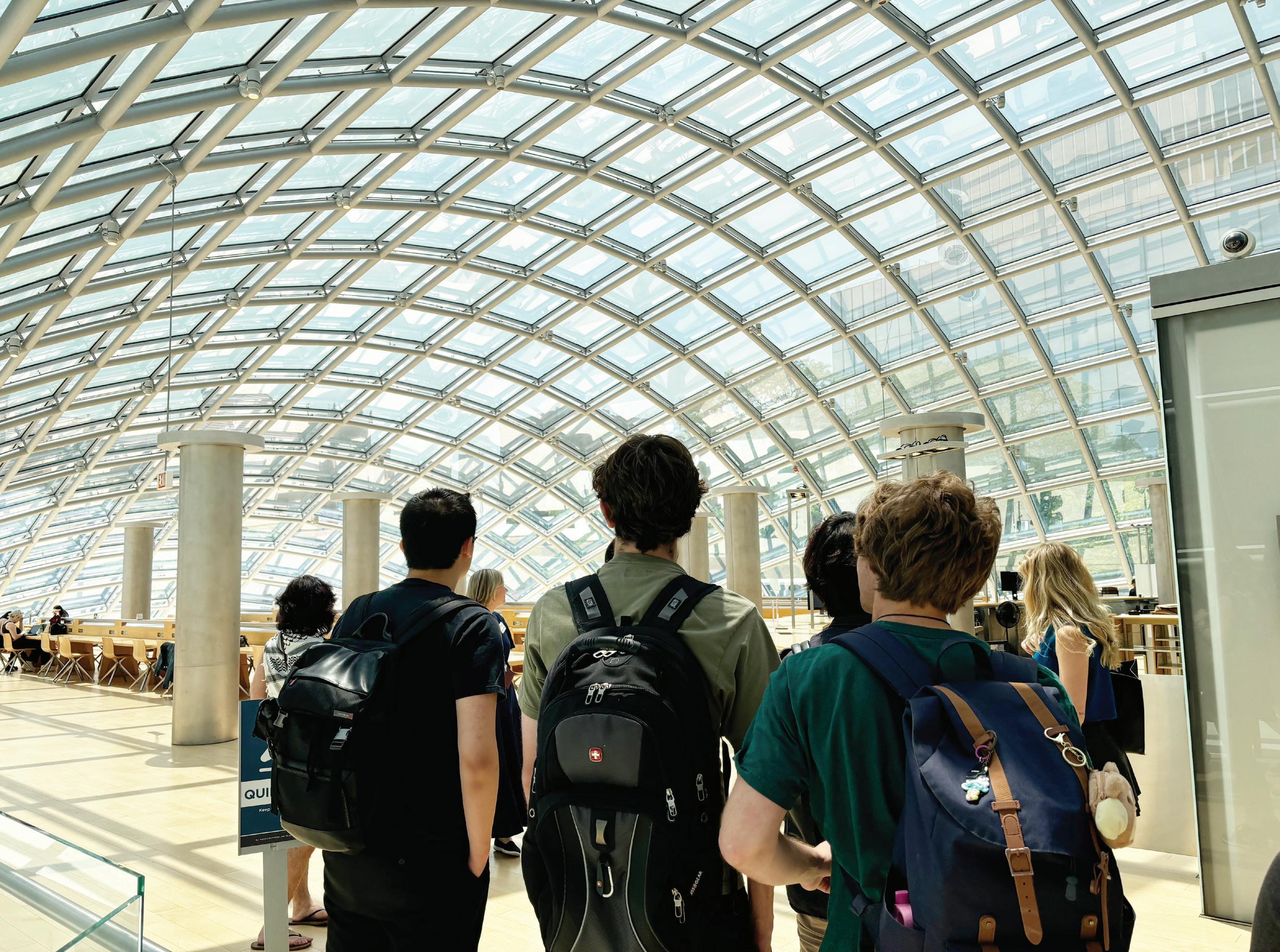





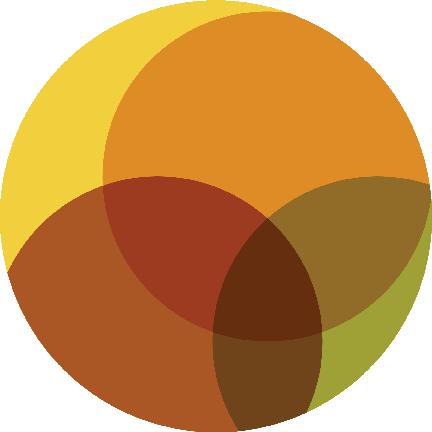
The Summer Institute in Social Research Methods (SISRM) connects undergraduate students to the core research mission of the Division of Social Sciences.
Through our training program, students develop methodological skills and gain first-hand experience in research with faculty experts across the University. As a result, students exit our program with refined skills in critical analysis that can be applied to a number of career aspirations and academic endeavors.
In 2024, SISRM offered a mixture of in-person and virtual classes, in-person workshops with streaming options, field trips to institutions around the Chicagoland area, and flexible RAships.
This year, SISRM welcomed 71 fellows to the program, including UChicago undergraduates, visiting scholars from Chicago State University and the Insper Institute of Education and Research, and UChicago Laboratory students.
In the 2024 cohort, 27 majors and 5 minors were represented, ranging from the biological sciences, to public policy, to astrophysics. While most of the fellows were rising third and fourth years, over 20% of them were between their first and second year, serving as a stepping stone in their academic journey at UChicago.
SISRM Fellows were placed into summer RAships with faculty from 18 departments (Appendix), and each fellow received a $5,000 stipend for the summer.
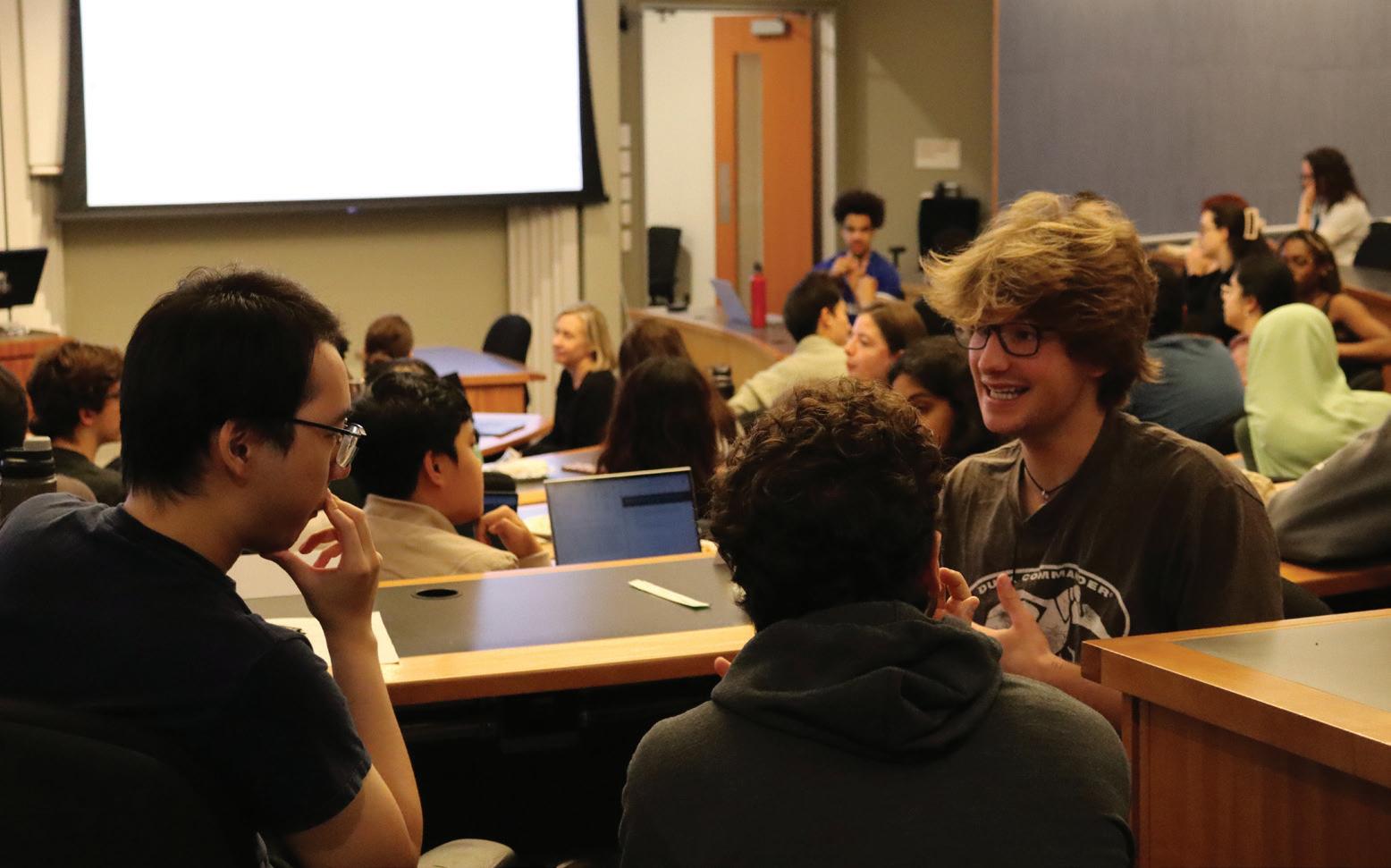
Stipends were sponsored by SISRM and generous contributions from the Hammack Family, the Mikheev Charitable Trust, the Weathertop Foundation, and the University’s Jeff Metcalf Internship Program.
Every year, SISRM offers academic year funding to faculty who wish to continue working with summer RAs during the academic year.
In the 2023-24 academic term, SISRM received $59,590 in funding from the Kemper Foundation through the College Curricular Innovation Fund to provide continued funding for 13 faculty projects (17 students). In addition, 8 other faculty projects had already secured additional funds provided by the Kemper Foundation for the summer of 2023 and the subsequent academic year.
In summer 2024, SISRM was also able to guarantee academic year funding to 4 students who received the Hammack Family and the Mikheev Charitable
“ My previous conception was towards a more limited/restricted view of what could or could not be considered as a social science. That being so, learning about how social sciences can vary from a wide spectrum, in between Psychology and History, was mind-opening to the opportunities related to research.”
Joao S. SISRM ‘24
Trust Fellowships. Thanks to their generous support, these 4 students will continue working on their RA projects during the 2024-25 academic year.
SISRM’s priority continues to be finding sustained sources of funding to support faculty projects during the academic year.
SISRM aligns with the University’s mission to engage with the city and the world through its mutually beneficial partnerships with Chicago State University and the Insper Institute of Education and Research in São Paulo, Brazil.
Already in its third year, the SISRM and Chicago State University partnership continues to thrive. Chicago State University (CSU) is a public university located in Chicago’s Roseland neighborhood, and this year, SISRM received a cohort of 5 students with diverse academic backgrounds ranging from english, to music production, to computer science. CSU students received full programmatic funding and participated in the RA fellows program. After 3 summers, SISRM now has 13 alumni from CSU.
After a successful launch in 2023, the international partnership with the Insper Institute of Education and Research brought 5 students from Brazil for the 10-week summer program once again. Participating students lived on campus and immersed themselves in courses, workshops, and excursions for the duration of their stay. The SISRM-Insper partnership is made possible by the generous
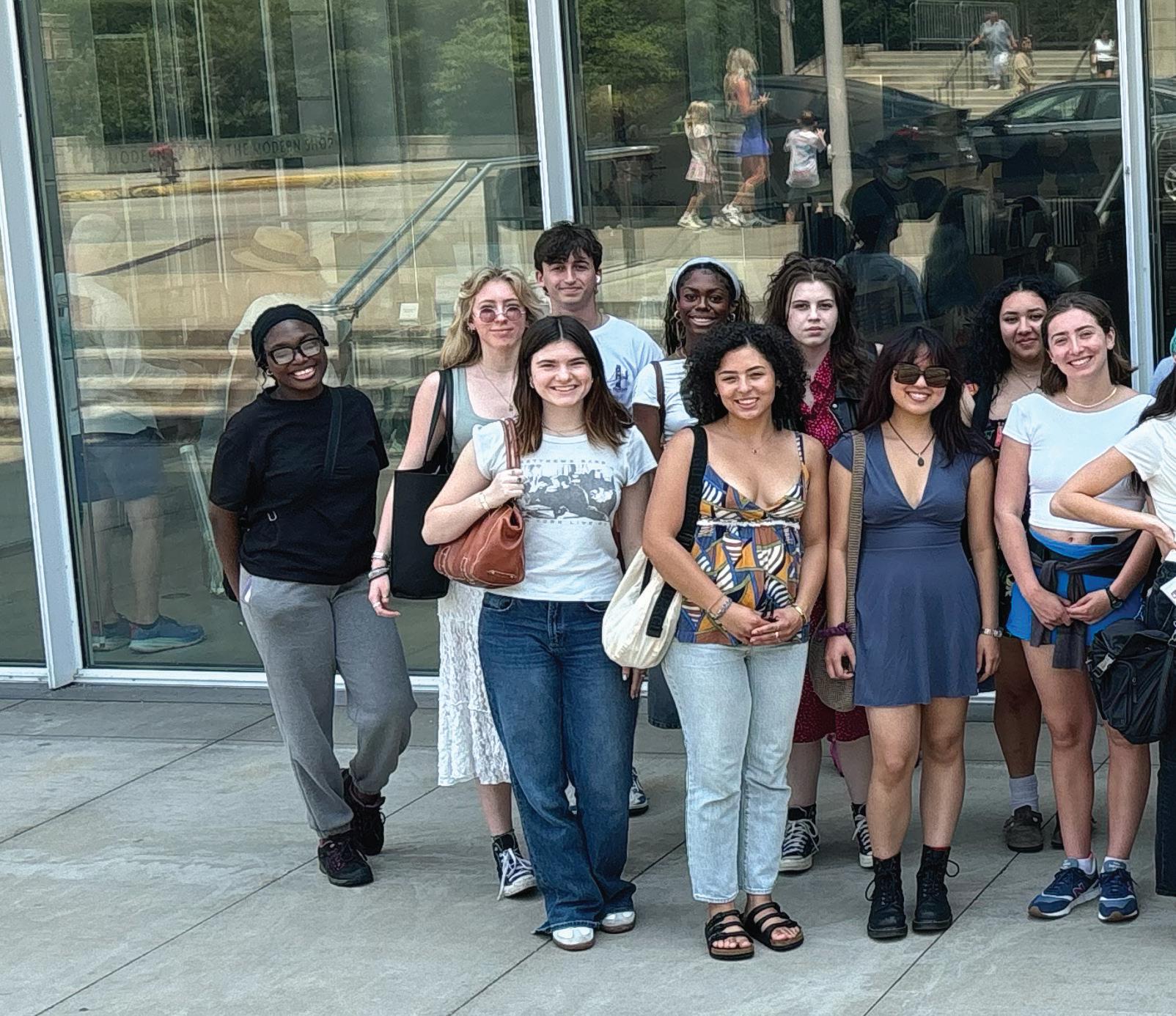
support of the Haddad Family Foundation.
Continuing the successful partnerships, SISRM anticipates hosting 5 CSU and 5 Insper students in Summer 2025. In addition, SISRM has been working with the Office of Civic Engagement and the Chicago City Colleges to build a programmatic option for City College students’ participation. Moreover, SISRM is exploring the possibility of partnering with the Associated Colleges of the Midwest. Both conversations are underway and will continue in the 2024-25 academic year.
After 6 years of summer programming, SISRM has 377 program alumni, 153 of
whom have not yet graduated. SISRM continuously works to support fellows even after their participation in the program is over by increasing the opportunities for alumni engagement and professionalization. In the winter of 2024, SISRM co-hosted with Career Advancement an Internship Search Workshop to help our alumni find opportunities for the summer. Similarly, at the SISRM Speaker Series, students had the chance to hear from UChicago alumni Claudio Lilienfeld and Margaret Hawthorne who shared their academic and professional experience after UChicago.
Moreover, SISRM organized a couple of study breaks for students to reconnect with each other while working on their midterms.
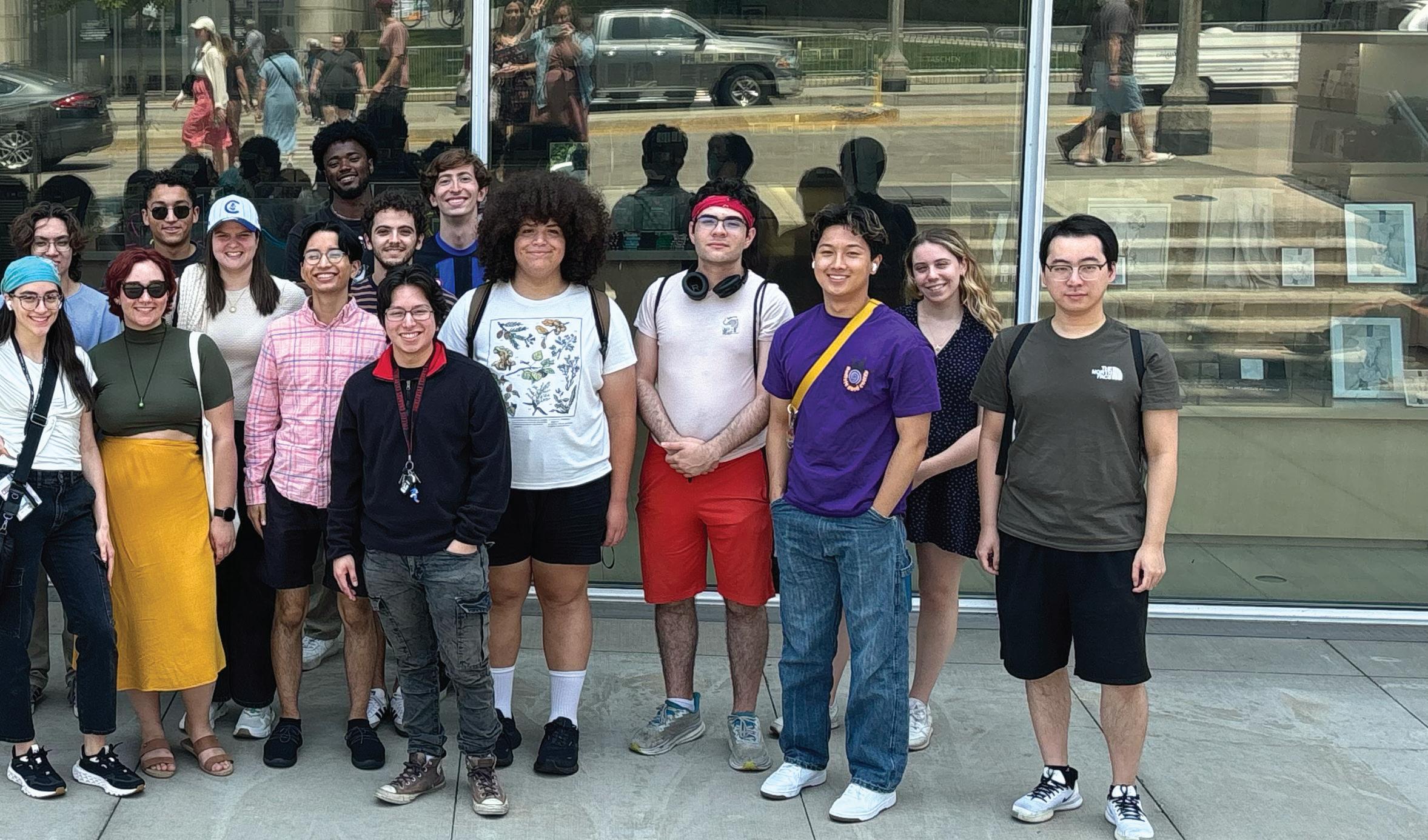
In addition, SISRM hosted its inaugural In Focus Photography Competition to highlight the importance of the experiences our SISRM alumni have in research.
In the coming academic year, SISRM will continue partnering with Career Advancement to gather information about alumni job placements and graduate school matriculation trends.
The continued success of SISRM relies on the ability to provide adequate academic and financial support to students of all backgrounds. SISRM is working closely with the University to identify donor opportunities as well as grant initiatives that align with our core mission. Additional funding sources will be crucial to support RAships and to reduce the cost of tuition for courses.
“
“Jasmin’s level of knowledge in dance and specifically African dance forms far exceed the expectations I had when I applied for a student with whom to work on this project in which we are partnering with an organization to submit a grant proposal to research African dance and art forms in the US. She is analytical in her thinking and her communication skills are excellent.”
Jennifer Hanis-Martin NORC
In summer 2024, SISRM sponsored 9 methodological courses, including a newly designed class, Approaches to Social Science Research Design, which allowed students to explore the critical foundations of social science research design. SISRM courses are designed to fulfill curriculum requirements in numerous degree programs. As such, SISRM fellows choose their required course based on their curricular needs and interests.
Methodological course enrollments include other University of Chicago undergraduate and graduate students, as well as non-degree visiting students and pre-collegiate students. In summer 2024, enrollments totaled 102 students, with SISRM fellows representing 67% of total enrollments.
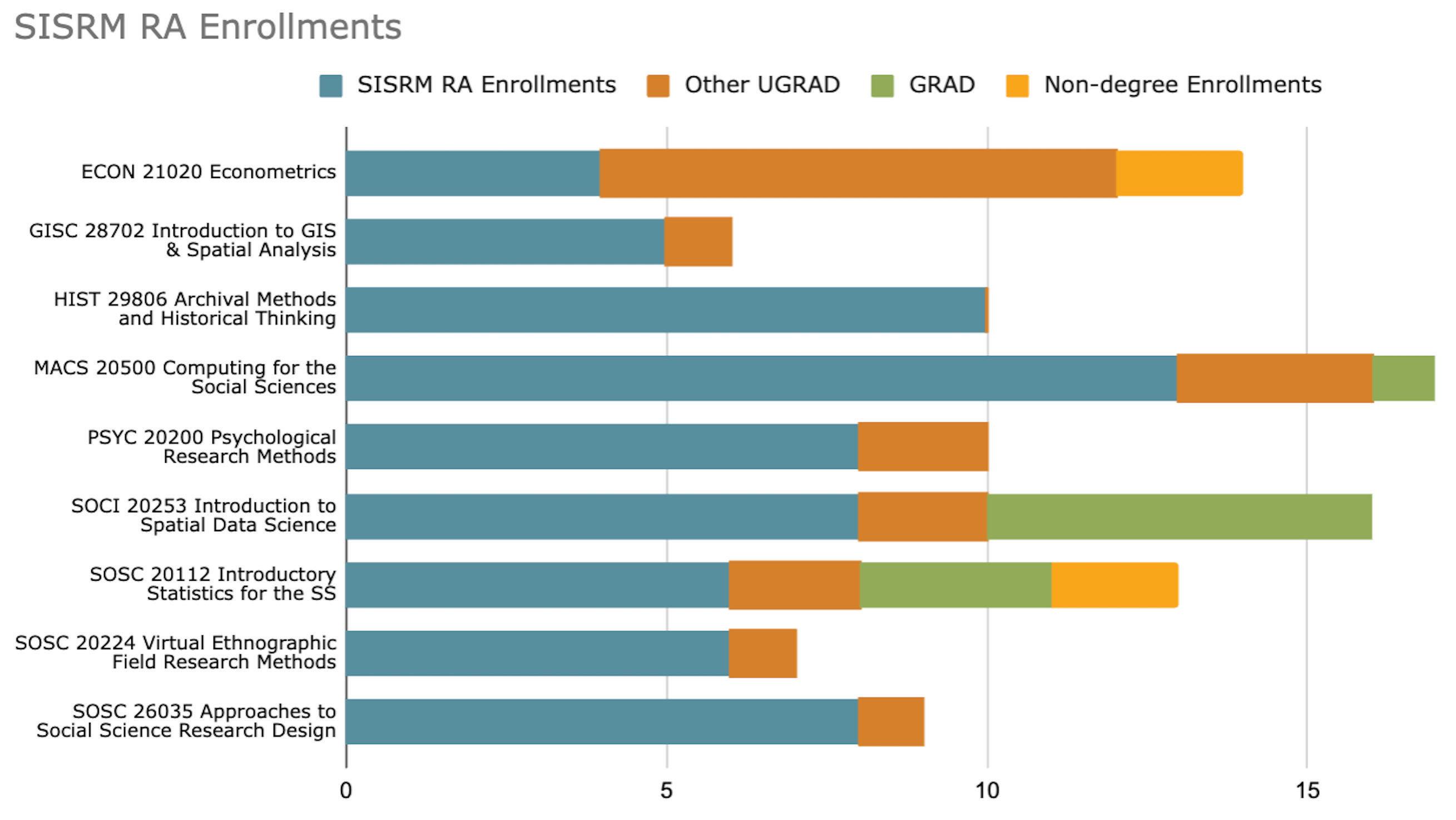
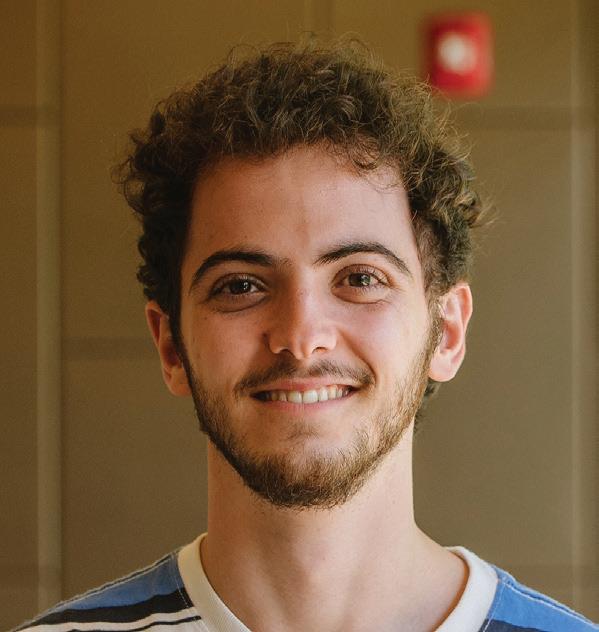
Leonardo G. is an Economics major and member of the Insper-SISRM cohort. He took Psychological Research Methods and worked with Professor James Heckman, Nobel Prize in Economics.
This summer, Leo worked on two initiatives in the Home Visiting Division at the Center for the Economics of Human Development. The project consists of sending workers to visit expecting and recent mothers to teach them about child rearing and family health. As an RA, Leo’s primary work focused on the creation of econometric methodology to set up and analyze randomized clinical trials to ensure home visits demonstrate their desired efficacy.
Moreover, Leo said that his experiences this summer have reaffirmed his passion for research. He explained that the academic environment at UChicago was very inspiring, and that he enjoyed meeting people through SISRM. Additionally, he took advantage of the many resources the University has to offer, such as libraries, and even $1 milkshakes. Leo particularly enjoyed Professor Poast’s Hyde Park tour, and named it one of the highlights of his time in SISRM and in Chicago.
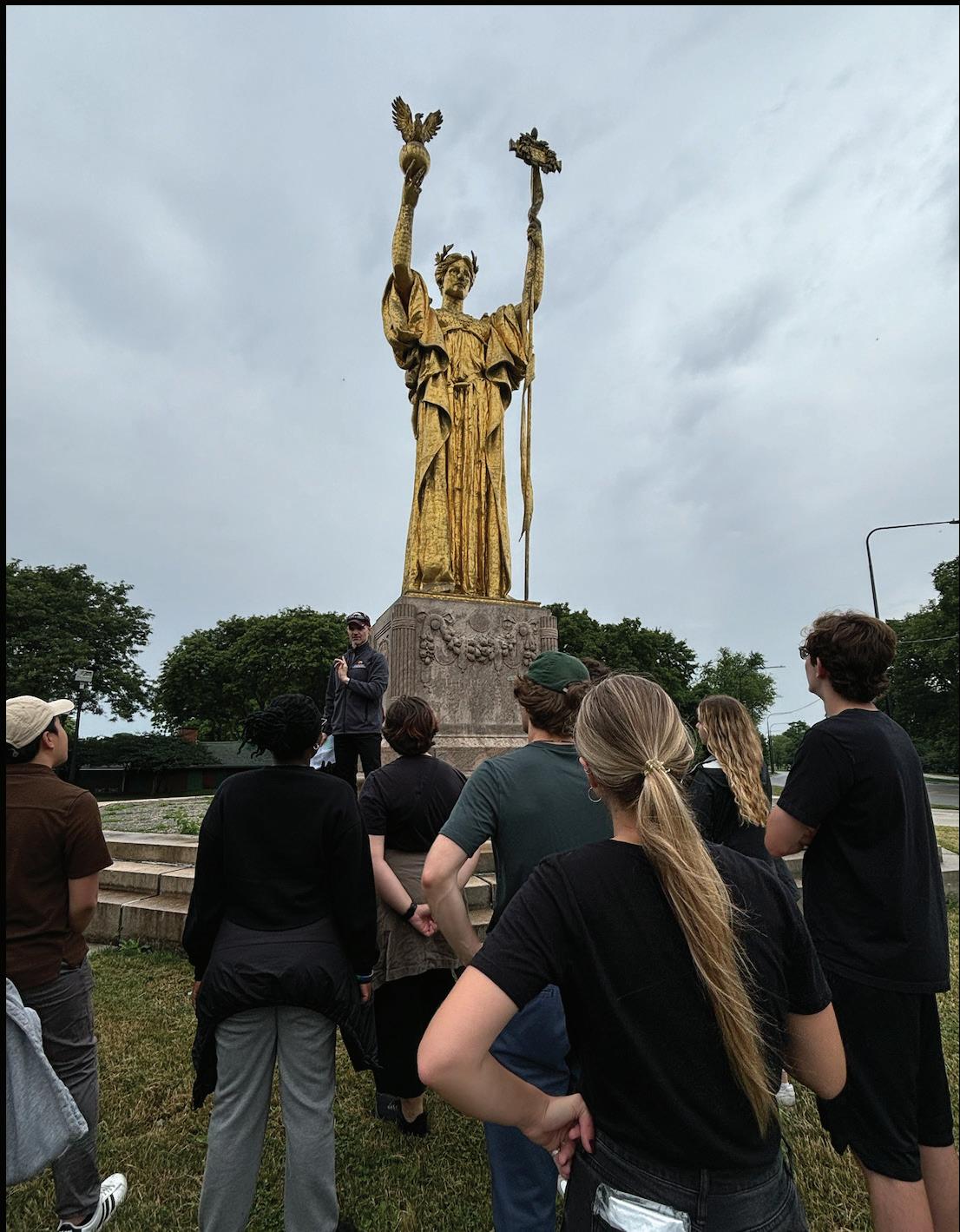
MAJORS
Anthropology
Art History
Biological
Sciences
Business Studies
Cognitive Science
Comparative Human
Development
Computation and Applied
Mathematics
Computer Science
Creative Writing
Criminal Justice
Critical Race and Ethnic studies
Data Science
Economics
English
Environmental and Urban Studies
Gender and Sexuality Studies
Global Studies
History
Inquiry and Research in Humanities
Law
Law, Letters, and Society
Mathematics
Media Arts and Design
Near Eastern Languages and Civilizations
Philosophy
Political Science
Psychology
Public Policy Studies
Race, Diaspora, and Indigeneity
Sociology
Statistics
MINORS
Architectural Studies
Data Science
English and Creative Writing
Health and Society
Media Arts & Design
Near Eastern Languages and Civilizations
Spanish
Statistics
Visual Arts
Declared majors and minors in the 2024 cohort of SISRM fellows.
In this course, students will be introduced to archival research methods and to the ways in which historians work with and interpret the sources they use in constructing historical narratives and arguments. We will visit Special Collections, explore digital archives, and consider the range of possible sources and archives, from texts held in national government archives to material objects, maps, audio or video recordings, and everything in between. We will also engage with the work of historians as they seek to make sense of the material they find in archives, considering questions of interpretation, narrative, and holes—that is, what is missing from archives. Students will gain an understanding of the mechanics of archival work and an appreciation for the complexity of historical thinking.
This is an applied course for social scientists with little-to-no programming experience who wish to harness growing digital and computational resources. The focus of the course is on generating reproducible research through the use of programming languages and version control software. Major emphasis is placed on a pragmatic understanding of core principles of programming and packaged implementations of methods. Students will leave the course with basic computational skills implemented through many computational methods and approaches to social science; while students will not become expert programmers, they will gain the knowledge of how to adapt and expand these skills as they are presented with new questions, methods, and data.
This course covers the single and multiple linear regression model, the associated distribution theory, and testing procedures; corrections for heteroskedasticity, autocorrelation, and simultaneous equations; and other extensions as time permits. Students also apply the techniques to a variety of data sets using PCs. The purpose of this course is to give a fundamental understanding of the liner regression model used on a variety of economic analysis. It also stresses the many issues that students may encounter when doing their own empirical analysis using the linear regression model as a tool.
This course provides an overview of how spatial thinking is translated into specific methods to handle geographic information and statistical analysis, with a focus on research questions relevant in the social sciences. Basics of cartography, spatial data wrangling, and the essential elements of spatial analysis are introduced within this context.


Yanyan Sheng Committee on Quantitative Methods in Social, Behavioral, and Health Sciences
This course introduces and applies fundamental statistical concepts, principles, and procedures to the analysis of data in the social and behavioral sciences. Students will learn computation, interpretation, and application of commonly used descriptive and inferential statistical procedures as they relate to social and behavioral research. These include z-test, t-test, bivariate correlation and simple linear regression with an introduction to analysis of variance and multiple regression. The course focuses on normal distributions, sampling distribution, hypothesis testing, and the relationship among the various techniques covered, and will integrate the use of SPSS as a software tool for these techniques.
Kerry LeDoux Department of Psychology
This course introduces concepts and methods used in behavioral research. Topics explored in class include the nature of behavioral research, testing of research ideas, quantitative and qualitative techniques of data collection, artifacts in behavioral research, analyzing and interpreting research data, and ethical considerations in research.
This course is designed to provide students in the social sciences with a review of ethnographic research methods, exposure to major debates on ethnographic research, opportunities to try their hand at practicing fieldwork virtually, and feedback on a proposed study that employs ethnographic methods. An emphasis will be placed on multimedia, digital, and virtual ethnography.
Spatial data science consists of a collection of concepts and methods drawn from both statistics and computer science that deal with accessing, manipulating, visualizing, exploring and reasoning about geographical data. The course introduces the types of spatial data relevant in social science inquiry and reviews a range of methods to explore these data. Topics covered include formal spatial data structures, geovisualization and visual analytics, rate smoothing, spatial autocorrelation, cluster detection and spatial data mining. An important aspect of the course is to learn and apply open source GeoDa software.
Andrew Proctor Department of Political Science
This course explores critical foundations of social science research design. The course will place emphasis on how social scientists identify and create data to empirically examine social phenomena through a variety of different theoretical and methodological approaches. The course will cover the relationship between research questions, design, and generating data across different methodological and epistemological approaches in the social sciences.
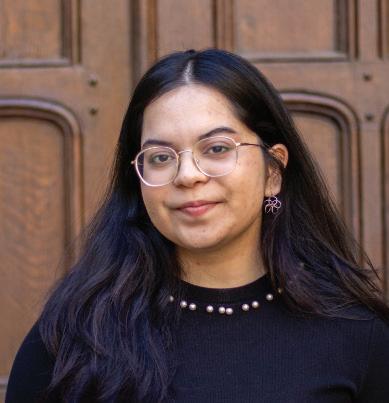
Arzoo U. is a rising thirdyear majoring in Economics and Psychology, with a potential minor in Quantitative Social Analysis. This summer, she took the Computing for the Social Sciences course, while also working at the Development of Social Cognition Lab, led by Dr. Katherine Kinzler.
As an RA for Professor Kinzler, Arzoo primarily worked on a project focused on how children perceive wealth and social mobility. This experience continued her year-and-ahalf-long involvement with the lab, deepening her interest in understanding human behavior, particularly at the intersection of social and cognitive psychology. Her long-term goal is to work in policy, particularly in financial literacy and education, and she sees her work in the lab as wellaligned with this ambition.
Throughout the summer, Arzoo participated in SISRM’s workshops series, which allowed her to learn more about academia from professors at UChicago, and solidified her interest in pursuing a PhD. Additionally, other workshops, such as the one from Career Advancement, helped Arzoo navigate her career aspirations by addressing key steps in the job search process.
“ “I felt that I learned a lot from workshops and hearing from different faculty. They really expanded my understanding of the social sciences. All the presentations were very engaging and interesting. My RA work helped me practice leadership skills and continued to develop my skills of interacting with study participants.”
Mackenzie L. SISRM ‘24
Opposite: Guizhe H. looks at a WWII exhibit at the DuSable Black History Museum and Education Center
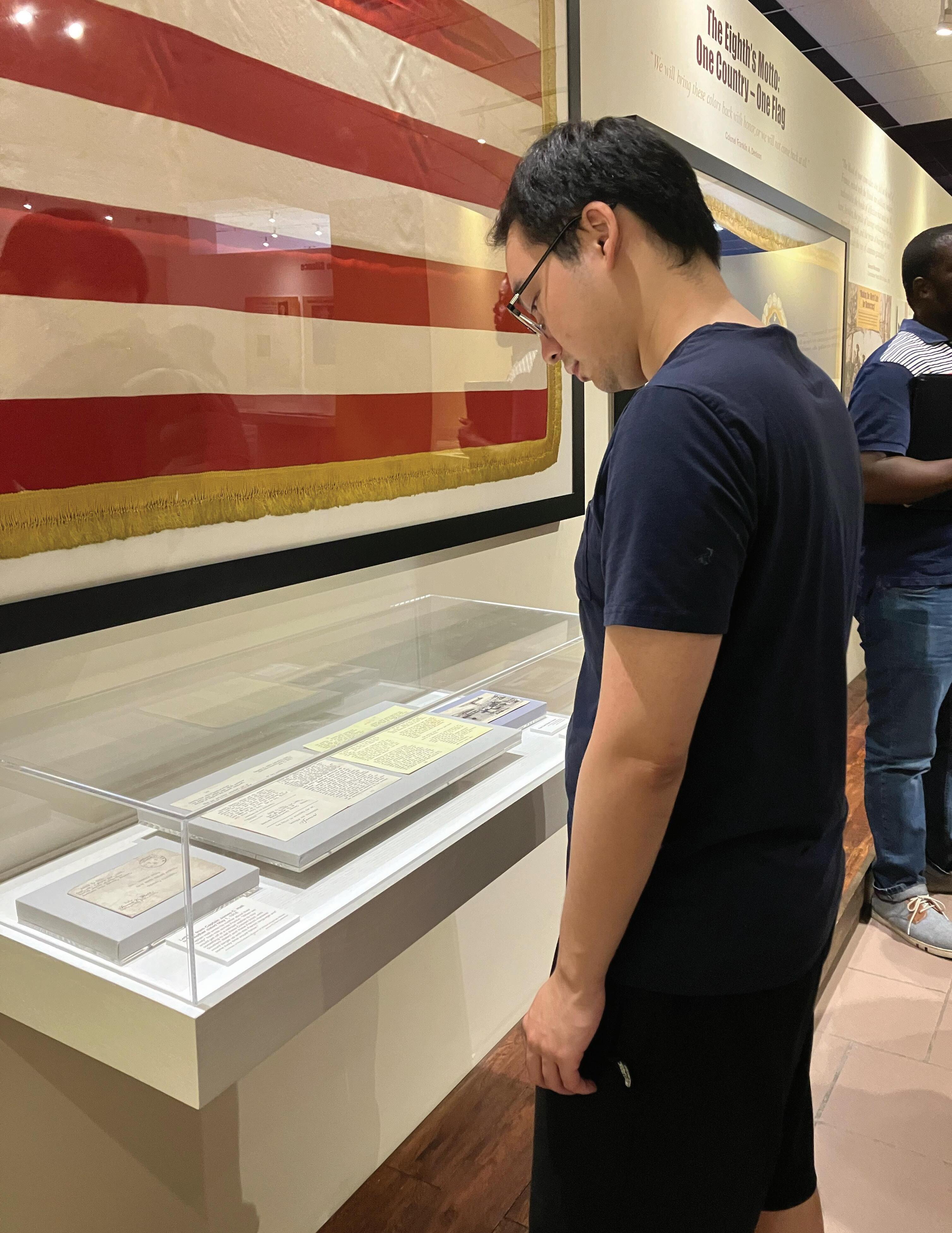
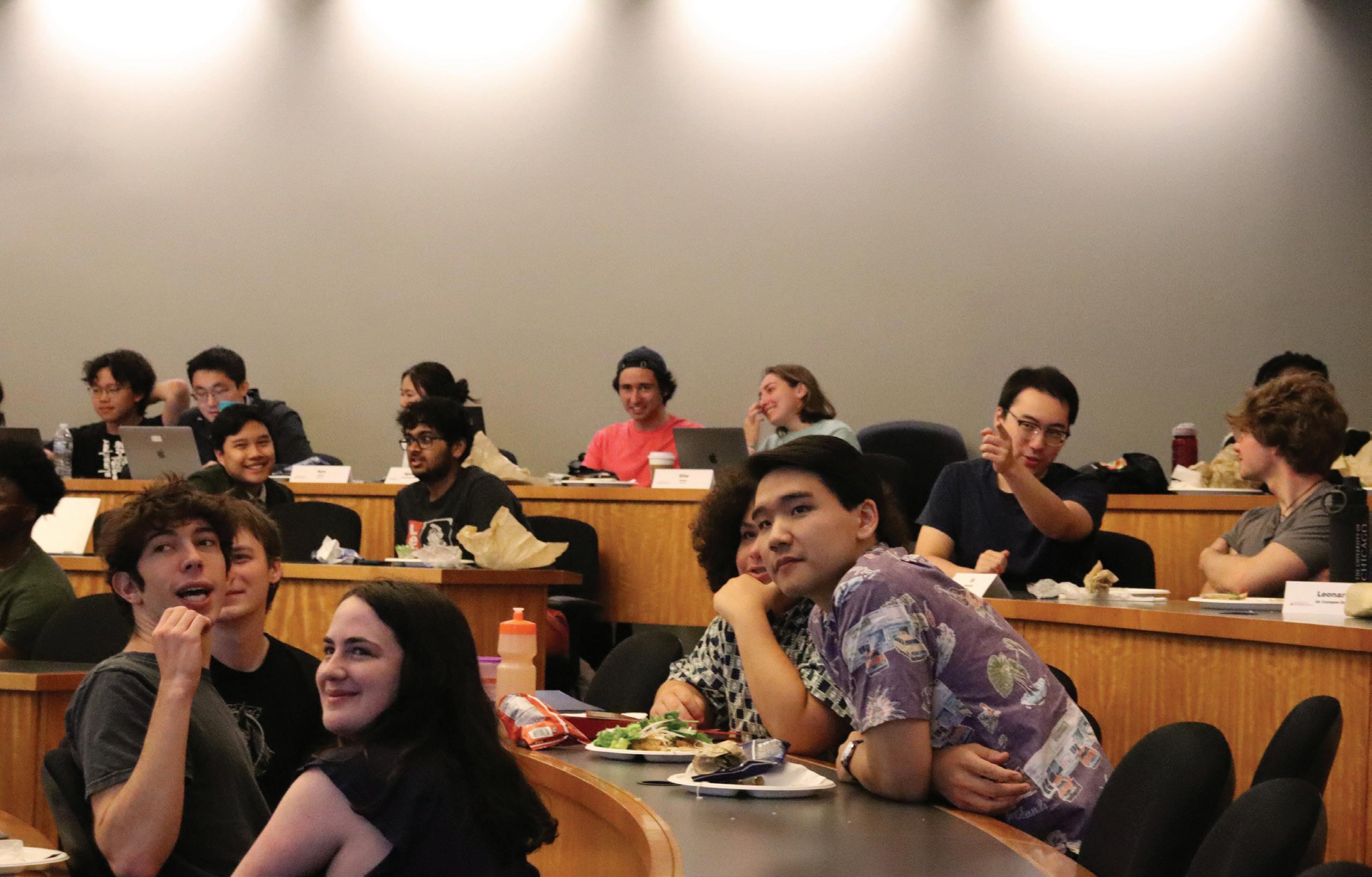
The SISRM workshop series intends to expose fellows to the practice of social science research by engaging with faculty and by introducing students to campus resources and other useful tools for their academic and professional development.
This year’s line-up included topics ranging from getting acquainted and making the most of library resources, to how to engage with new AI tools, to applying to graduate school, to learning about entrepreneurship.
In 2024, SISRM’s workshops also welcomed students from the Leadership Alliance, the XLab summer research fellowship, and the BFI’s summer program. These external groups
actively participated and took advantage of the academic and professional resources that the SISRM workshop series offers.
In addition to the regular workshops, SISRM fellows participated in excursions to the Field Museum, the Art Institute of Chicago, The Dusable Black History Museum and Education Center, and Mindworks: The Science of Thinking. Fellows were also able to participate in a special tour of Hyde Park with director Paul Poast.
SISRM’s workshop series allow students to explore Chicago during the summer, while also learning about the various professionals paths that a social sciences background can offer.
American Century Tour of Hyde Park
Director Paul Poast’s tour of Hyde Park with stops at the locations that helped establish the United States as a World Power
Stops Included: The 1893 World Fair’s Statue of the Republic; the site of the first nuclear chain reaction, Stagg Field; the classroom where Francis Fukuyama delivered his “End of History” speech; and the ice skating rink in the Midway where the Ferris Wheel had been placed during the fair.
Art Institute of Chicago
Experience, Marketing, and Technology Design
SISRM fellows received an inside-peek of how the AI uses research to create and market its exhibits from members of the creative team.
The Field Museum
Public-Facing Collections
SISRM fellows learned from researchers about how their ongoing research using the vast collections relates to contemporary conversations surrounding ecology, anthropology, and ethics. SISRM fellows also got to see some artifacts from the collections.
Dusable Black History Museum and Education Center
Chicago-based Historical Exhibits
Fellows received a guided tour of the museum led by the Education and Programs Assistant, where they learned about exhibits that focus on the history of Chicago and its people.
Mindworks: The Science of Thinking
Bringing behavioral science research to the public
The Mindworks exhibit provided SISRM fellows with the opportunity to see hypotheses tests, data collection, and research findings in action. Fellows were able to participate in research data collection as a group as well as individually through MIndworks-issued research surveys.
This year, SISRM offered two additional excursions during the 4th of July weekend.
American Writers Museum
Literature through Interactive Exhibits
Shedd Aquarium
Learning about Marine Life and Conservation
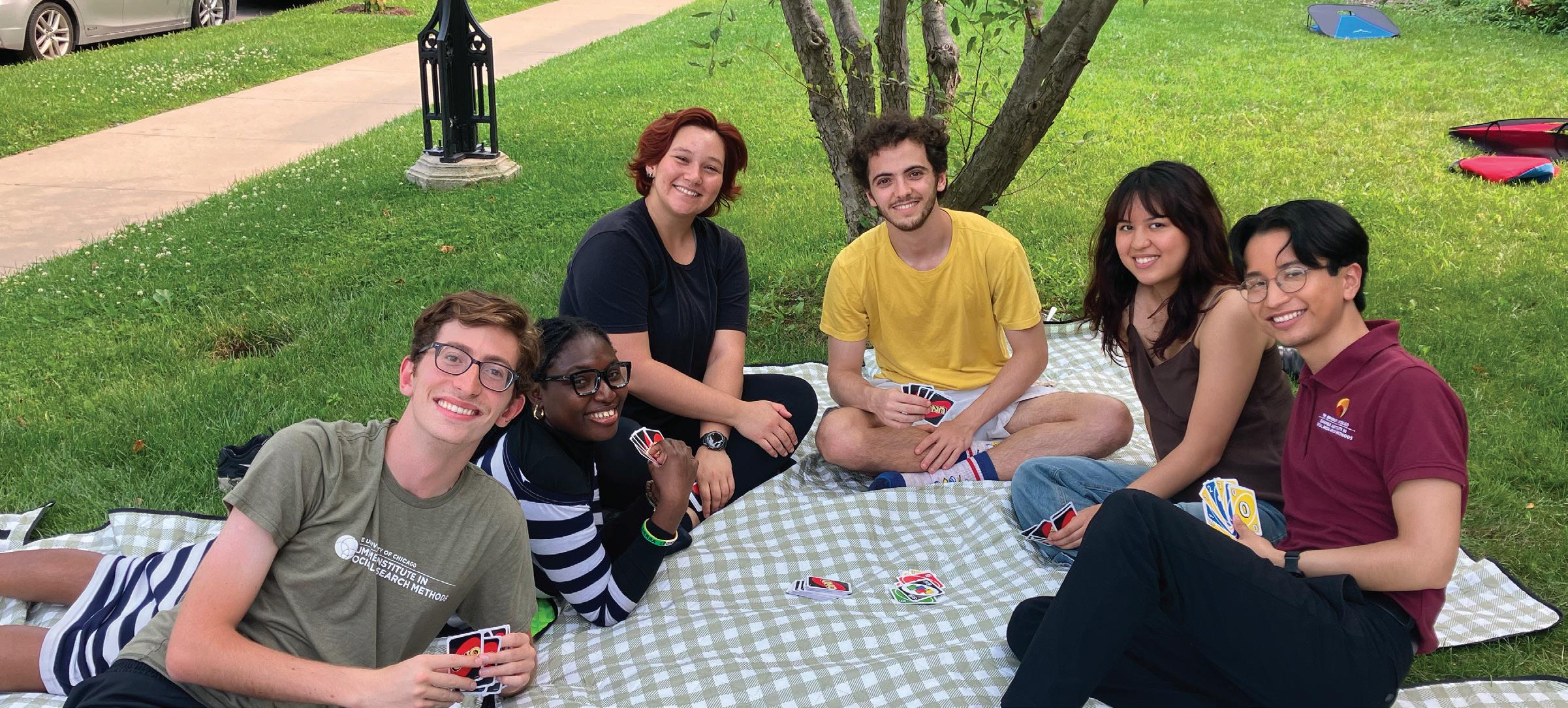
The first week of the workshop series introduces the social sciences at UChicago: what are they, what makes them important, and how can students participate in them?
Panel: What Do We Mean By ‘Social Science Research?’
A discussion of how defferent fields fit within the context of the social sciences and the advantages and disadvantages of interdisciplinary work
Leslie Kay, Department of Psychology
James Sparrow, Department of History
Social Science For Humanity: We Can’t ‘Tech’ Our Way Out Of It
Discussed the value of social science research as it applies to solving Big Problems
Paul Poast, Department of Political Science
This set of workshops help students explore potential career paths as prospective graduate students, and future professionals.
Graduate School 101
Lindsey Weglarz, Assistant Dean of Students For Admission
Mapping Your Career Journey: Exploration and Application
Daniel Clark, Program Director, Careers in Behavioral Sciences
Entrepreneurship 101
Brittany Wisniewski, Careers in Entrepreneurship at Career Advancement
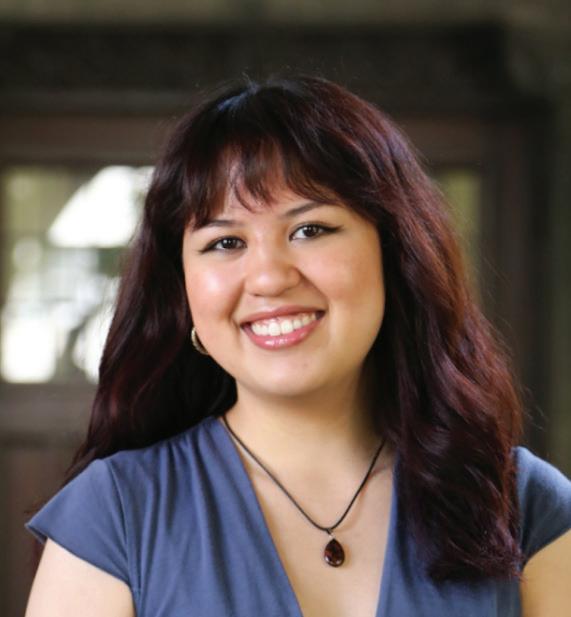
Dani M. is a rising third-year double majoring in anthropology and linguistics. This summer, Dani took Virtual Ethnographic Field Research Methods, and worked as an RA with Professor Chiara Galli from the Comparative Human Development Department.
As an RA, Dani worked on a project that focused on the interactions between the Chicago community and Venezuelan migrants, specifically through her field site at a free store that serves as a hub for these migrants. Dani’s role involved engaging with the community, conducting interviews, and observing the dynamics at the store. Her ability to speak Spanish was a key factor in her decision to join the project, as it allowed her to communicate effectively with the Venezuelan migrants. Over time, she developed a deep connection with the people at the site, expressing admiration for the strong sense of community and the volunteers’ dedication to helping others.
Dani found great value in SISRM. She particularly appreciated the “Chalk Talks,” which introduced her to various aspects of social sciences and highlighted resources available at UChicago. The talks on library resources and graduate school were especially beneficial, providing her with insights into the support systems in place for students. These resources have been crucial in navigating her academic journey, as well as her future career.
Spotlights UChicago faculty members’ personal research pursuits and their approaches to disciplinary methods
Patricia Posey Department of Political Science American Political Economy and Race: Asking BIG Questions
Anthony Lee Zhang UChicago Booth School of Business Business Research Topics and PhD Exploration
Wilma Bainbridge Department of Psychology
Testing Memory in the Real World
Marco Garrido Department of Sociology Studying People’s Experience of Democracy
Samuel Fury Childs Daly Department of History
How to Make Paper: Historical Research in Difficult Archives
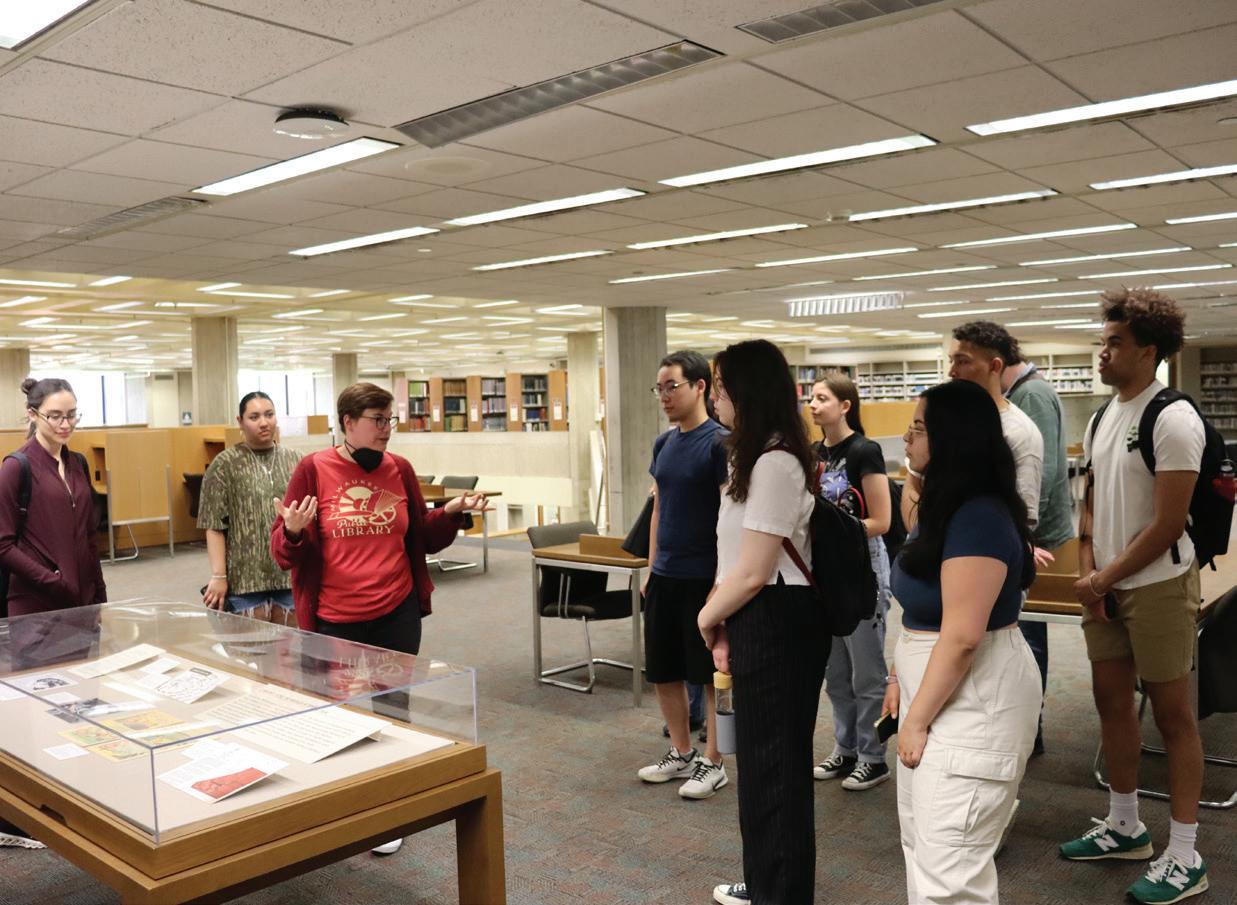
Introduced tools and methods to ensure research is ethical and accessible considering new technologies.
Understanding the SBS IRB: Ethics and Protections for Human Subject Research
Cheryl Danton, IRB Managing Director
Pulling the Wool Over AI
Taylor Faires, Digital Scholarship Librarian
An Introduction To GIS and Related Resources
Rob Shepard, GIS LIbrarian
Ask, Scale, Apply: Research Questions Part 1 and 2
Rebecca Starkey, Director of Teaching and Academic Engagement, University of Chicago Library
Elizabeth Obregon, Assistant Director of Undergraduate Research, College Center for
These sessions introduced fellows to the resources available to them for their research, and connected them to the librarians who support their major and minor programs.
The Library: Exploring its Resources
An in-library tour of resources, people, and where to find them
Kristy Lueshen, Student Success Librarian at Regenstein Library
Digital Scholarship and Your Research Identity
Elias Hubbard, Center for Digital Scholarship Program Manager
Data in the Social Sciences
Taylor Faires, Digital Scholarship Librarian
Greg Fleming, Business and Economics Librarian.
SISRM Fellows receive a tour of the Regenstein Library from Kristy Lueshen.
Fredrik Albittron Jonsson History
Britain’s transition to the fossil economy
Luc Anselin
Center for Spatial Data Science/ Sociology
Evolution of retail mix in main street U.S.
Crystal Bae
Center for Spatial Data Science
Spatial Analysis of Chicago Transportation Infrastructure
Anne Beal
Social Sciences Collegiate Division; Self, Culture, and Society
Retheorizing Psychoanalytic Theory to Account for Difference: Subjectivity and Third Culture Kids
Jennifer Benz NORC
The Associated Press-NORC Center for Public Affairs Research
Angel Bohannon NORC
Tools for democratizing research use
Christina Brown Economics
Labor markets and education in Pakistan
Kathleen Cavanaugh Human Rights/History
Unsettled Histories: Storytelling of State in the US, the UK, and Turkey
Shereen Chaudhry
Booth School of Business
Resolving a Conflict Requires Negotiating Over a Shared Reality
Maliha Chishti
Harris School of Public Policy Women, Peace and Security in the MENA region
Hans Christensen
Booth School of Business
Artisanal Mine Certifications and Conflict Dynamics in the Congo
Yuting Dong History
Mapping Neighborhoods in Japan’s Empire: A Digital Humanities Project on Infrastructure’s Socio-Political Influences
Fulya Ersoy Economics
School Principals, Use of Discipline, Racial Disparities
Chiara Galli
Comparative Human Development
A welcoming city? The reception of asylum seekers in Chicago
Oscar Galvez-Soriano Economics
Impact of English Instruction on Labor Market Outcomes: The case of Mexico
Julian Go Sociology
Policing the War on Drugs
Susan Goldin-Meadow Psychology
The communication of social thought through non-verbal gestures
Jennifer Hanis-Martin NORC
National Survey of Artists Working in Traditional African Dance and Music
Matthew Harris
Divinity School
Black Religion and Occult Networks in Chicago
Shannon Heald Psychology
Factors that support serendipitous solution-finding in aesthetic and non-aesthetic settings
James Heckman Economics
Creciendo Juntos: A Preparing for Life Program
James Heckman
Economics

Collaborations on Public Policy and Academic Research on Skill Measurement, Skill Development, and the Consequences of Skills
James Iveniuk NORC
A measurement booklet for racial inequity
Waldo Johnson
Crown Family School of Social Work, Policy & Practice
The Fatherhood Research Initiative
Leslie Kay Psychology
Human odor psychophysics
Katherine Kinzler Psychology
Development of Social Cognition
Benjamin Lessing Political Science
Organized Crime and Territorial Control in Brazil’s Prisons and Peripheries
Yue Lin
Center for Spatial Data Science Equity in location-allocation problems
John List Economics
Economics Summer Voltage Research Program
Jeff Lockhart Sociology Knowledge networks: Who gets credit in scholarship?
Zhiying Ma
Crown Family School of Social Work, Policy & Practice
Development of Community Mental Health in China
Agnes Mondragon Celis Anthropology
The Drug War and US Empire: Forensic Knowledge and Extraterritorial Criminal Jurisdiction in Kingpin Trials
Shigehiro Oishi
Psychology
Urban Cultural Affordances and Psychological Richness: How Does Urban Life Increase the Well-being of Its Residents
Ada Palmer
History
Renaissance Costume Library
Robert Pape
Political Science/CPOST
American Political Violence Project
Robert Pape
Political Science/CPOST
Collaboration with West Point’s Counterterrorism Center
Robert Pape
Political Science/CPOST Database on Suicide Attacks
Paul Poast
Political Science
Conflict in International Relations
Martin Castillo Quintana
Harris School of Public Policy
Quantitative analysis of the UN peace mission in Haiti
Eugene Raikhel
Comparative Human Development Crisis and Critique in college mental health
James Robinson
Harris School of Public Policy/ Political Science
The Developmental State in Korea
Monica Rosenberg Psychology
Connectome-based modeling of internally focused attention
Eduardo Salinas
NORC
Project at the Center on Equity Research
Kristen Schilt
Sociology

New You or True Self: The Social Process of Major Life Change
Christopher Stewart
Booth School of Business
Captured Regulators and Product Market Competition
Emily Talen
Social Sciences Division
Three-dimensional digital modeling of historic urban neighborhoods
Alex Tate
Center for Healthcare Delivery Science and Innovation at UChicago Medicine
Hospitality Project
Alexander Todorov
Booth School of Business Intuitions about Sampling
Robert Vargas
Sociology
Bias and Conflicts of Interest in Policing Science
Fan Yang
Psychology
Children’s perceptions of fulfilling duties to the self in relation to happiness
Jai Yu
Psychology
Understanding human and animal movement during social/non-social interactions
Luigi Zingales
Booth School of Business
Business Elites
Undergraduates participating in the program are matched to work as RAs with UChicago faculty on an assortment of ongoing projects. To date, SISRM has supported 377 student RAships with 160 members of the research community.
• Anthropology
• Art History
• Becker Friedman Institute for Economics
• Biological Sciences
• Booth School of Business
• Center for Latin American Studies
• Center for Spatial Data Science
• Chicago Project on Security & Threats (CPOST)
• Committee on Environment, Geography, & Urbanization
• Comparative Human Development
• Computational Social Science
• Crown Family School of Social Work, Policy, and Practice
• Divinity School
• Economics
• English
• Environmental Frontiers Project
• Harris School of Public Policy
• History
• Linguistics
• Mansueto Institute for Urban Innovation
• Master of Arts Program in the Social Sciences
• Neubauer Collegium for Culture and Society
• NORC
• Political Science
• Pozen Family Center for Human Rights
• Psychology
• Race, Diaspora, & Indigeneity
• Smart Museum of Art
• Sociology
• UChicago Medicine Center for Healthcare Delivery Science and Innovation
• Urban Labs
“Elijah has been the driving force in this project, which aims to replicate an old study with a new twist, concurrent measurement of working memory capacity. He has done meticulous work at every stage and learned several new skills, including recording a tool from a colleague’s lab to work with his study. He is owning this research like he’s an advanced grad student, and I have to keep reminding myself that he is not.
Leslie Kay Psychology Department
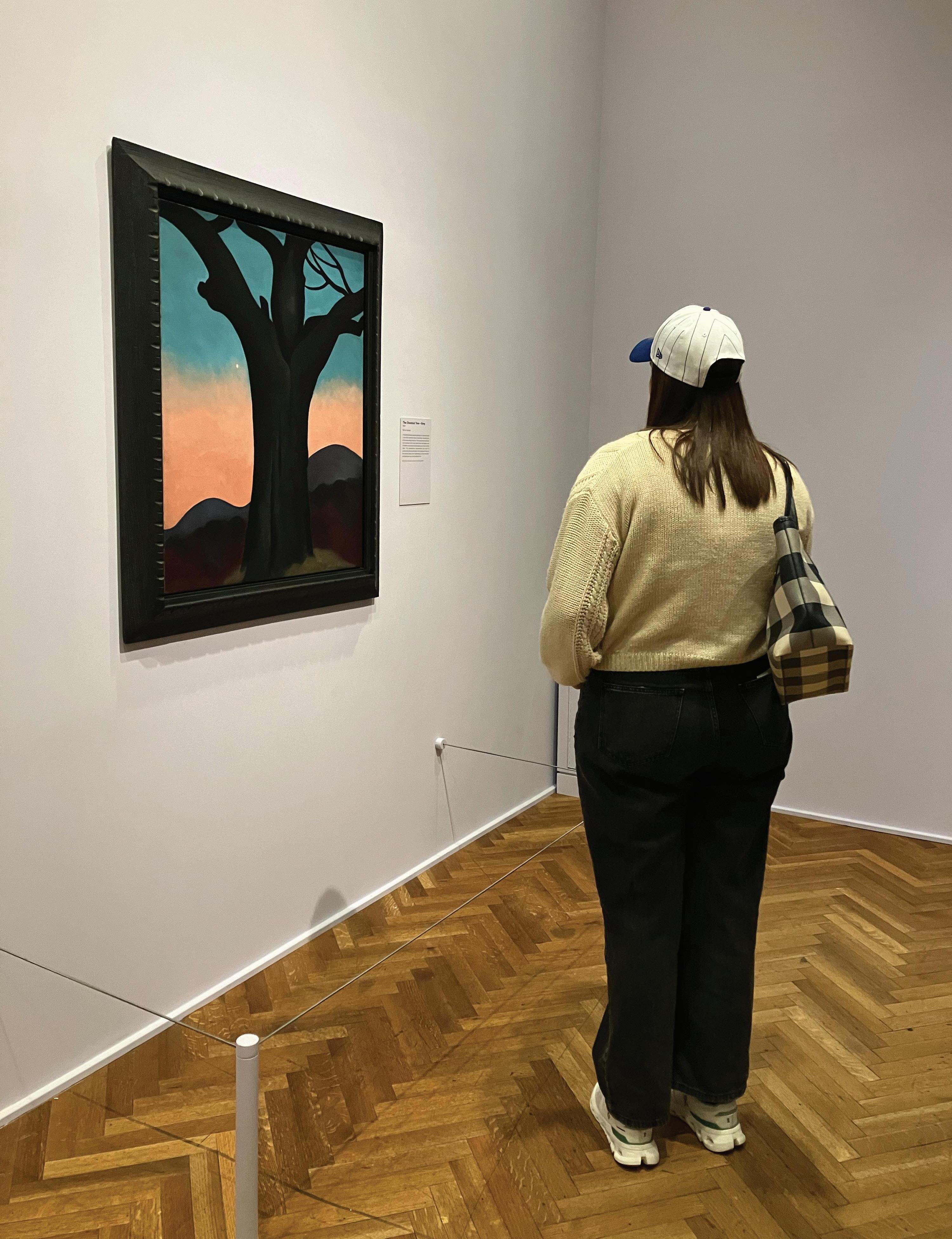
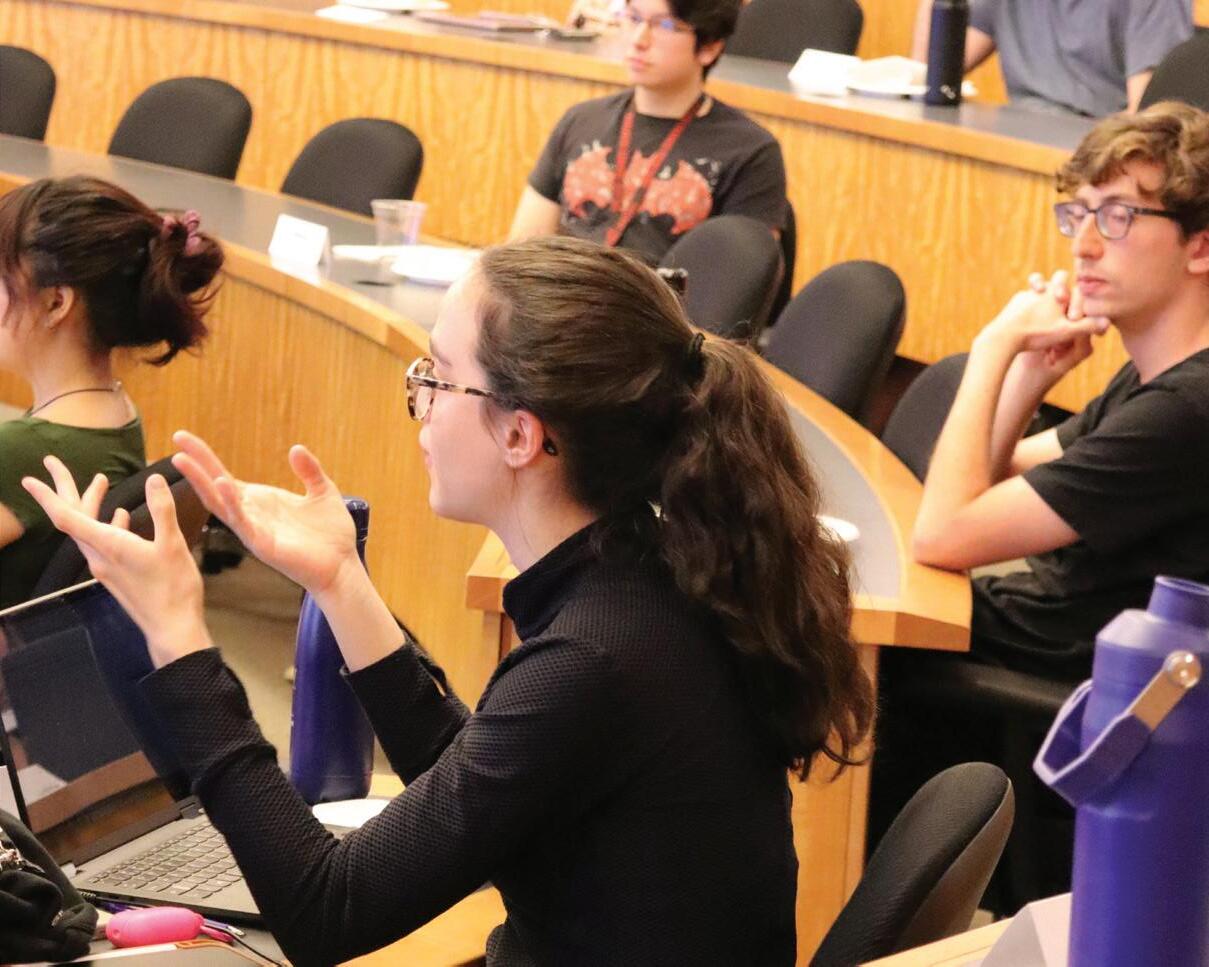
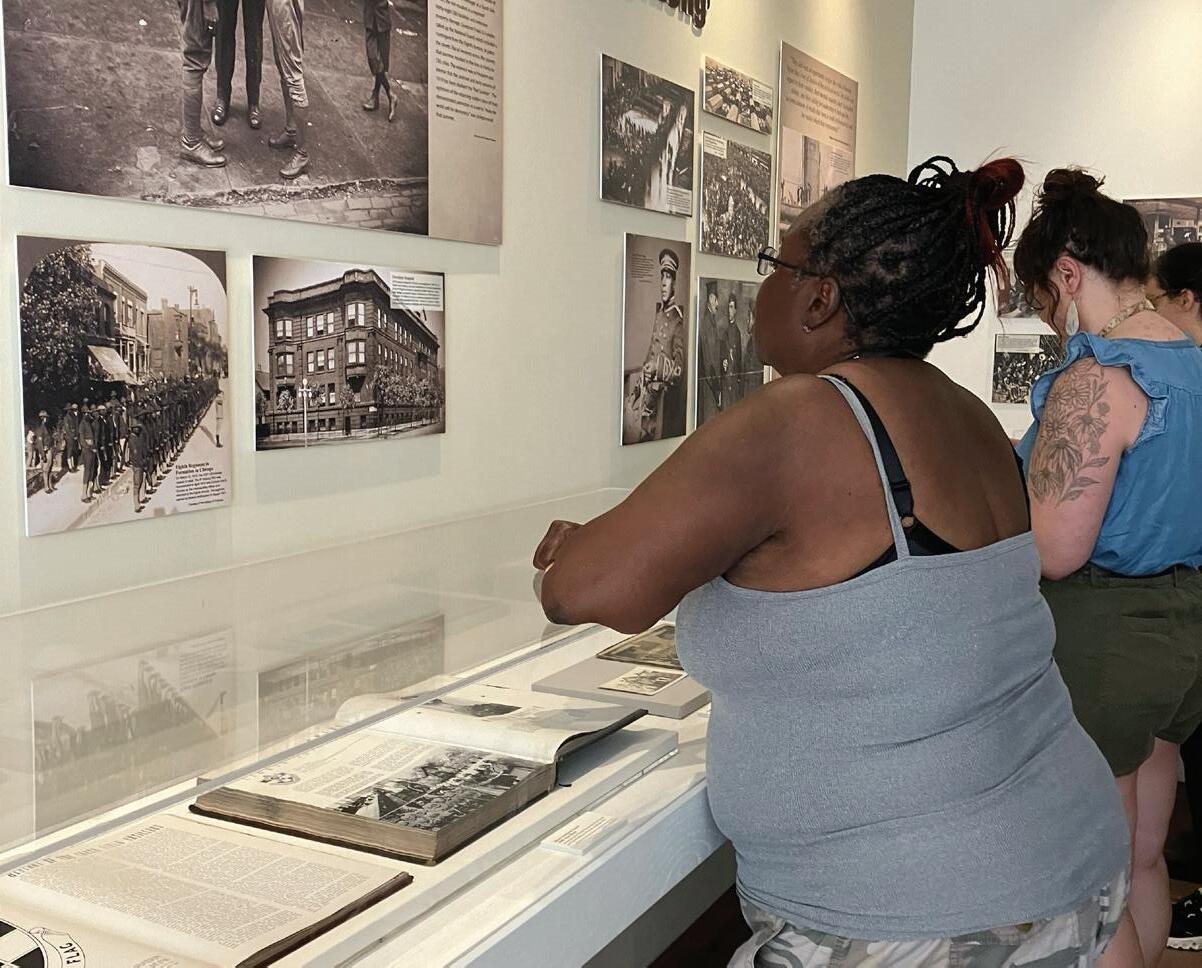
“I learned so much through the SISRM workshops, which provided me with supplemental professional skills development. Also, as an RA for the Hospitality Project at UChicago Medicine, I interviewed inpatient and discharged patients to collect data which helps doctors improve the quality of care at the University of Chicago Hospital. Overall, SISRM was a great opportunity to gain experience with well-established professionals.
Lisa D, SISRM ‘24
